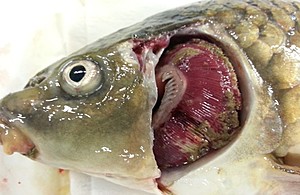Outbreaks of Koi herpesvirus (KHV) disease in 2020

KHV is a serious viral disease of fish and is a listed disease in the United Kingdom. It affects all varieties of common and ornamental carp species (Cyprinus carpio) and can result in large scale mortalities. Fish with KHV disease may show the following signs, especially when water temperatures are between 16 to 28 °C:
- necrotic (white or brown) patches on the gills
- rough patches on the skin and sloughing mucous
- sunken eyes
You must contact the FHI if you suspect an outbreak of KHV. This includes fish with the above signs, or deaths of carp or carp hybrids.
There is no risk to public health.
Confirmed designation
If a notifiable disease is confirmed, FHI places controls to limit the spread of disease (these are known as confirmed designations). The following conditions are applied under disease controls:
- No person may, without the previous consent in writing of the FHI, move any aquatic animal including eggs, and gametes, into, out of or within a confirmed designation area.
- Disposal of dead aquatic animals, including eggs and gametes, must be by an approved method for disposal of Category 2 animal-by-product waste in compliance with local Environmental Health department requirements
- Notify the Fish Health Inspectorate immediately should mortalities re-occur or spread to other waters within the designated area.
- Ensure the disinfection of all angling equipment such as unhooking mats, nets and weigh slings, prior to being removed from the designated area (exclusion of rods, reels and fishing line accepted). For this purpose, maintain on-site facilities for the disinfection of angling equipment upon exit from the designated area, as directed by the Fish Health Inspectorate. Maintain efficacy of disinfectant solutions in accordance with the manufacturer’s instructions for use.
- The use of dedicated angling equipment supplied by the fishery is permitted, for sole use within the designated area.
- Display disease control zone signage on site for public information, as issued by the Fish Health Inspectorate.
- Notify the FHI in advance of all intended physical changes to sites within the designated area – such as site boundaries, number or size of waters, use of the site. FHI written permission will be required beforehand for all such changes.
- All requests for consents required under this Confirmed Designation Notice must be submitted to the FHI with a minimum of 5 working days’ notice.
New outbreaks
When laboratory testing confirms KHV disease at a site, the FHI place statutory controls to limit the spread of the disease. These controls restrict movement of aquatic animals and ensure equipment is disinfected.
Sites with KHV disease must undergo a formal monitoring programme for the duration of the calendar year immediately following the outbreak. The FHI visit these sites to look for evidence of disease and to inspect compliance with the conditions of the statutory controls in place. The controls are removed if the disease doesn’t reoccur during this period.
Some sites choose to cull and disinfect their stocks, rather than undergo monitoring.
Diseases controls lifted at:
Further information
You can:
Background
Koi herpesvirus disease (KHV) is a listed disease under The Aquatic Animal Health (England and Wales) Regulations 2009. KHV outbreaks have been subject to statutory controls in the UK since 2007. The UK maintains a surveillance programme for this disease.
When the FHI confirm an outbreak, they take steps to control and, wherever possible, remove the disease. This may involve movement controls on susceptible species in the affected area, enhanced biosecurity, culling of fish, and cleaning and disinfecting of the premises.
Once statutory controls are in place the site operators must write to the FHI to get permission to move live fish into, out of, or within the designated area, and to make material changes to the site or site activities. This also applies to fish eggs and gametes.
Last updated 15 February 2022 + show all updates
-
Controls are now lifted at: CD02.2020 – Tylers Common – EW009-B-335 CD03.2020 – Churchmere Pool – EW086-C-296 CD04.2020 – Brookfield Fisheries – EW105-W-114 CD05.2020 – Waterloo Farm Leisure – EW041-D-369 CD06.2020 – Ringles Reservoir – EW056-G-374 CD07.2020 – Swan Farm Fishery (formally Harpers Hill Fishery) – EW105-Q-108 CD08.2020 – Paradise Fisheries – EW080-T-957 CD09.2020 – Eden Fishery – EW105-T-111 CD10.2020 – Castle Ashby Fishery Lakes – EW042-W-012 CD11.2020 – Kimber View Pools – EW105-C-250 List updated to reflect this change.
-
A new confirmed designation published CD11.2020
-
Two new confirmed designations listed and CD08.2020 amended
-
A new confirmed designation listed CD08.2020
-
A new confirmed designation listed CD07.2020
-
2 new confirmed designation listed
-
CD04.2020 map up-dated
-
A new outbreak of KHV listed for 2020
-
Listed edited to include confirmed outbreak of KHV disease at Churchmere Pool.
-
Changes to include the control conditions to sites that have a CD in place.
-
Change in listed outbreak sites
-
First published.
